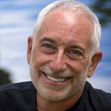Mark David Gerson's Blog, page 20
May 30, 2011
The Voice of the Muse: A Reader's Journey
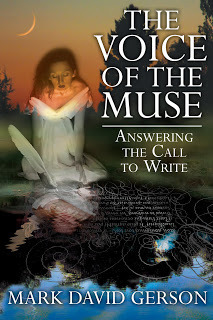 In this morning's email, I was alerted to a very unusual review of The Voice of the Muse: Answering the Call to Write. Rather than offering a traditional ranking and critique, reviewers at The Uncustomary Book Review chronicle their experiences and relationship with the books they write up.
In this morning's email, I was alerted to a very unusual review of The Voice of the Muse: Answering the Call to Write. Rather than offering a traditional ranking and critique, reviewers at The Uncustomary Book Review chronicle their experiences and relationship with the books they write up.Kat Kiddles's review offered me a too-rare window on the journey you travel, as the book's reader. If you've already made that sojourn, you'll undoubtedly recognize some of Kat's experiences in your own. If you haven't, she offers you a movingly personal up-close view of what you might expect.
The Voice of the Muse
Review by Kat Kiddles
Reprinted from The Uncustomary Book Review ~ May 29, 2011
Full Title: The Voice of the Muse: Answering the Call to Write
Author: Mark David Gerson
Publisher: LightLines Media (2008)
Number of Pages: 248
How long it took me to read: 1 year, 2 weeks, 3 days
Where I got this book: A heavily hinted at Christmas gift
ISBN: 978-0-9795475-5-3
Audio Excerpt: Guided Meditation #10: You Are a Writer
Like a Moth to a Flame
I'm not really sure why I was drawn to this book. I remember watching an interview with the author on a webcast. I think it was during a stage in my development as a writer when I was just warming my mitts to the idea of working with a muse. The creative process was still foreign and uncomfortable; holding my pen brought back ridiculous memories of grade school when we used sausage-sized pencils to learn how to print and the idea of calling myself a writer made me want to cower behind desperate attempts at topic changes so that people would get back to talking about themselves. (Not quite sure how that differs from today, but that's too large a can of worms to open this late in the evening.)
Favorite Five Quotes
Whittling 13 down to 5…I propose that the top 5 quotes from this book are:
5. "The pain is in the resistance." (p.113)…and my pick for the No.1 quote is…
4. "You ask why you fear the blank page even as you know that the act of writing will make you feel better. It's simple: The fear of the void far outweighs any perceived benefit that might arise from allowing it to be filled." (p.112)
3. "Your imagination is limited by what you think you know. When you let go of that, when you leap off the bridge or cliff with nothing but trust, that's when you fly." (p.233)
2. "The fiercest ridicule and loudest, cruelest judgment will come from those who are touched most deeply by your words…Your critics are touched at a place deeper than they feel comfortable going, so their reaction and response is one of cruelty." (p.69)
1. "Writers often have the cleanest windows, floors, fridges and toilets, the most up-to-date filing system or the best record for returning calls or e-mails because, in the moment, just about any task seems more palatable than sitting down to write." (p.136)
New Words
Words are wondrous creatures. Put them together and they paint a picture. Rearrange them and the scene changes. But to be able to see what they are saying, we must first know what they mean.
• New Word: egress (noun)
Definition (Source: WordBook iPhone App): 1) (astronomy) the reappearance of a celestial body after an eclipse; 2) the becoming visible; 3) the act of coming (or going) out; becoming apparent
Synonyms: 1) emersion; 2) emergence, issue; 3) egression, emergence
Origins: 1538; from Latin 'egressus,' from egredi 'go out,' from ex- 'out' + -gredi, comb. form of gradi 'step, go.'
As in: "If you would but open your heart and allow what longs to flow from you easy egress, there would be no block." (p.113)
Conversation with the Reader
While I read, I write, and as I write, I read. Here's some of what I wrote while I read this book:
"I so often feel I'm writing books I don't know about yet. Is it because the words I'm writing are going to be published one day, or because my scribbled notes will become the fuel of future stories? It's strange, living a life that you know is going to be something someday, but that still isn't. I suppose it's akin to being a gardener, sewing seeds in the soil, knowing that one day the garden will be there, its form only visible in the imagination."
•
"Gerson's book is asking me a question, so I suppose I'll attempt to answer it.
Where are you now? Where are you now in your writing? In your life?"Well! I can see we're starting off on an easy note this morning! Alright, where am I now in my life? Well, I'm in a funny place that has me looking to past relationships as I position myself for my next step. I'm in a place of searching and building. I suppose part of that process is about tying up loose ends, taking these last few moments to indulge in reflecting on the unresolved experiences that have made me who I am today, and making sure I'm as ok as I can be about what it took to get me here.
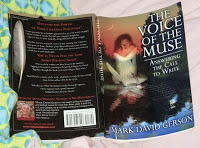 "Where am I in my writing? Well, a few months ago, I was struggling to write 500 words every other day. Today, words flow into everything I do. They spill onto the sheets of my notebook and splatter onto the pages of my blogs. I write job proposals and professional profiles. I contribute to magazines and draft content for clients. I'm seeing many value-added opportunities through the marriage of writing and education (my passions); however, what I'm not seeing is the coming along of my book…or books (perhaps it's better to just use the singular for now). So, wherever I am in my writing, it's a place wrought with the guilt of not doing more work on it, overgrown with the fear of facing it, and polluted with clouds of uncertainty that make it all the more difficult to see the path ahead.
"Where am I in my writing? Well, a few months ago, I was struggling to write 500 words every other day. Today, words flow into everything I do. They spill onto the sheets of my notebook and splatter onto the pages of my blogs. I write job proposals and professional profiles. I contribute to magazines and draft content for clients. I'm seeing many value-added opportunities through the marriage of writing and education (my passions); however, what I'm not seeing is the coming along of my book…or books (perhaps it's better to just use the singular for now). So, wherever I am in my writing, it's a place wrought with the guilt of not doing more work on it, overgrown with the fear of facing it, and polluted with clouds of uncertainty that make it all the more difficult to see the path ahead."When I close my eyes and think of a word that represents where I am in this moment, change gurgles up my creative esophagus, followed by a reflux of transition, metamorphosis, chameleon, creation, building blocks, turning corners, cultivation, honing, fine tuning, tweaking, experimenting, listening, silence, soliloquy, crafting and obstacling.
"Although not a 'real' word, obstacling feels as though it encompasses so much of my current reality – the act of overcoming obstacles. Obstacling. Maybe that's my word of the day.
"Next, Gerson asks about his readers' expectations,
What do you want from this book?"My first thoughts are of what I don't want. I don't want homework or assignments. I don't want exercises every few pages or activities that make me stop to reflect. Then again, a wise man recently told me that 'children don't always know what's good for them,' so perhaps I would benefit from focusing less on what I don't want.
"What I want from this book, then, is a friend – a friend that reassures me that I'm not alone, that reminds me that I'm not crazy, and that encourages me to keep swimming (a reference that will make sense to those of you who've conversed with Goldberg on her Long Quiet Highway."
•
"Humph. Is writing really as simple as tuning into the frequency of your heart, putting pen to paper, and then just…transcribing? I think I might have sort of maybe thought of it like that once before, but only now that I've read it on Gerson's page is it really beginning to sink in. It might actually be that simple. I know that I'm not supposed to judge, that I'm supposed to trust, so maybe fine-tuned transcription is the perfect approach. But what do you do when you have pages and pages of writing, files of notes and a partial manuscript, all insisting on getting your attention? What do you do with all the words once you've poured them (at least some of them) out?"
•
"I fear my pen will run out soon. I suddenly see my pen as a powerful wand, a Harry Potter wand, a magical wand of words!"
•
"Enough dust has collected on the cover for me to be squeamish about picking it up. Although I'm aware that the message of the book is what I'm actually fearful of, I firmly believe that dust bunnies have no place in the literary equation."
•
"Demand brings force. Force inspires fear. Fear drowns out the silence and muffles the gentle hum of creativity."
•
[In response to Guided Meditation #1 - Meet Your Muse (pp.36-8)]
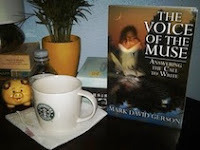 "I crossed the threshold of my imagined door, a door engraved with mystical carvings on glimmering, ancient wood. It felt cold on the other side. Everything was dark, black. My muse, a muse, something, approached; an outline of white, the skeleton of a winged creature. We stood, face-to-face, being-to-being, in an empty space of resolved (resigned) understanding. The gift I received before making my way back was a blank page and a pen. The unspoken message, something along the lines of, 'Keep going.'
"I crossed the threshold of my imagined door, a door engraved with mystical carvings on glimmering, ancient wood. It felt cold on the other side. Everything was dark, black. My muse, a muse, something, approached; an outline of white, the skeleton of a winged creature. We stood, face-to-face, being-to-being, in an empty space of resolved (resigned) understanding. The gift I received before making my way back was a blank page and a pen. The unspoken message, something along the lines of, 'Keep going.'"The encounter hasn't left me feeling fulfilled or inspired. It's made me wonder what's around the corner. It's making me more aware of consequences, the way choices impact the courses of our journeys. I had thought, had assumed, that once the first drop dribbled over the cliff's edge, there would no stopping the cascade. Am I about to experience a drought?"
•
[In response to the writing exercise on p.51]
"My healing lies in a place of self-embrace, where sizes are stretched and words are dressed in colorful tunics embroidered with lace from foreign lands no map can chart. My healing lies in the space between my breath – a place undisturbed by attempts to control and define. My healing lies outside of me, for everything inside pushes order ahead of the unknown. How can healing have enough room to spread and stretch in a space too small to measure? My healing lies in a place I haven't found, in a direction I'm forgetting to look. Does healing mean succeeding, or is it just another sequence of letters defining acceptance?"
•
"What would you say if someone were to tell you that the book you were about to start reading was equivalent to a yoga class for writers, where the words were the teacher and the writing activities were the poses? How would you feel holding a verbal asana for minutes at a time, meditating on the imagery of the author's vision, while trying to maintain a deep, even breath? To me, it feels as though I'm wobbling my way through tree pose, desperately trying not to fall on my face, not because of the inevitable pain but to avoid having to publicly admit that I couldn't do it. When reading words turns into a strenuous exercise, it's difficult to want to get back to the verbal gym the next day."
•
[In response to the writing exercise on p.98]
"I follow my pen wherever it carries me. Today it carries me to…
"…the ends of the earth, where I can tickle the stars with the tips of my lashes and caress the sands with a hand touched by the mercy of a moment's repose.
"…the center of the softest of all marshmallows, where there's none of the stickiness and all of the joy these puffs bestow upon good girls and boys when the time comes to greet the forest and count the leaves and feel the freedom of sleeping outside.
"…a place with no walls and no keys and not even ripe cheese. All that exists is the nothingness in between."
•
"I trusted today. I trusted, despite time constraints and inner fears. I trusted. I sat in front of the computer, and I trusted. What poured out was a story I discovered for the first time as it filled the screen. I trusted words today, and now I think I believe that words trust me. They trust me to carry them with me each day. They trust me not to lose them as I rifle through my bag for a piece of gum and dig through my change purse for my office key. They trust me to share them with you. It is for trust that I am grateful today."
•
"Reading this book can be restful, which isn't an adjective I expected to use when I started it. I expected a tormented experience that thrashed me against the waves of my resistance. Instead, or rather, in addition to what I expected, I also got a reminder to breathe, encouragement to withdraw from the tension and to splash in my frothing pool of unused words.
"I wouldn't recommend this book to commuters who spend their time reading on trains, not unless you have a very steady hand when inspiration strikes. Then again, perhaps I shouldn't assume people still write with quill on parchment. Gerson does inspire, but more than encouraging me to write, he continuously reminds me to relax – a welcome reminder he seems to have known I would need nearly each day of the year it took me to complete my journey with him. For that, I am thankful."
•
"Near the end of the book, Gerson reflects on how the meaning of words is defined more by the meaning we put into them than by the meaning we find in the dictionary. He talks about what the word feedback means to him.
"On first thought, feedback is something I feel as though I'm supposed to like, supposed to be open to, supposed to want to invite into my writing process. On second thought, I admit to fearing the process – fearing being told to go back and rewrite what I thought had already taken full form. But if I'm honest with myself, if I open up to the core of my truth, then the process of receiving feedback is akin to (slowly and patiently) unwrapping a present.
"Even when you know you're going to get a gift, that first moment of receipt is so often filled with excitement. You see the beautiful promise of potential coming your way. There is so much possibility in that moment, so much fuel for the imagination.
"Then you begin to unwrap it. You notice the slightly ripped paper, the uneven folds, the off-centered ribbon, the strips of wrinkled tape. You disregard them, refusing to give them permission to ruin the perfect image of your first impression.
"Once you get past the paper and bows, you reach the box – undecorated, unimaginative, disappointing. You may even discover that it's a recycled box of crackers or of discounted muffin mix that's been forming the shape of your gift.
"It's only when you work through the process of unwrapping your present, tearing apart its shell of generic packaging, that you begin to capture a glimpse of the true gift hidden inside. The more you unwrap, the closer you get to your truth.
"The best part of feedback is the realization that the real gift was better than what you first expected. Yes, sometimes you get a gift you don't want or that you don't think you need, but that's just life's way of helping you learn acceptance. And, as is often the case when the festivities are over, you're left with lots of used wrapping paper, some of which will get tossed, and some that can be salvaged for future gifts."
• Reprinted from The Uncustomary Book Review: A Conversation with the Reader, 5/29/2011

Published on May 30, 2011 10:33
May 22, 2011
Acts of Surrender 19: Infinite Creation, Infinite Mind
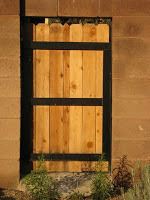
"If you do the land's bidding, you can build a house that's organic to it."
~ Frank Lloyd Wright, in Nancy Horan's fictional biography, Loving Frank
Although Frank Lloyd Wright speaks here about architecture, what he says applies to all manner of creation. If you do a story's bidding, you can build a novel, screenplay, short story or nonfiction book that's organic to it. And if you do a soul's bidding, you can build a life that's organic to it, too. For isn't life the ultimate creative act?
Too often, we allow the limitations of what we think we know to constrict what's possible, what's natural, what's organic. But the possible, natural and organic have nothing at all to do with what the human mind perceives. They have everything to do with what the infinite mind perceives.
You don't have to believe in God to believe in "infinite mind." For all that the concept of infinite mind suggests is that there is a wisdom that transcends our conscious thoughts, desires and creations. How often has a notion popped into your head that seems to make no conventional sense? And how often have you followed it through only to discover, perhaps in distant retrospect, that it made more sense than anything else you could have ever possibly tried to figure out?
 That's God or infinite mind or the muse or, as Wright might put it, nature at work.
That's God or infinite mind or the muse or, as Wright might put it, nature at work. My whole life, it seems, has been predicated on that notion -- that there's a force at work that has a much clearer sense of what will serve and satisfy my deepest (often hidden) desires than the childish cravings of a limited mind ever could.
In his upcoming book, Game Over
 , my friend Adam Bereki describes it as watching the game not from the field or the stands, but from a blimp floating high above the stadium. It's not a blimp that's separate from us, any more than God, muse, infinite mind or nature are. These are all aspects of all of us, all pieces we carry within us. What we don't all do is acknowledge, access and experience it. What we don't all do is let it, with its broader, deeper perspective and infinite wisdom, be in charge.
, my friend Adam Bereki describes it as watching the game not from the field or the stands, but from a blimp floating high above the stadium. It's not a blimp that's separate from us, any more than God, muse, infinite mind or nature are. These are all aspects of all of us, all pieces we carry within us. What we don't all do is acknowledge, access and experience it. What we don't all do is let it, with its broader, deeper perspective and infinite wisdom, be in charge.Writers often balk when I suggest that their stories are smarter, wiser, cannier and craftier than they could ever hope to be. Writers, like all human beings, would prefer to believe that they can be in control and still create from a place of infinite possibility.
 Not even the God of Genesis is that arrogant. God doesn't "make" creation happen. God allows creation to occur. "Let there be light," He says. And light appears. Not because God forces His will on it. But because he allows light its natural form, shape and substance. And when each day's creation is done? He doesn't sit in judgment over it, calling it worthy or unworthy. He recognizes that all creation has innate merit and declares it to be "good."
Not even the God of Genesis is that arrogant. God doesn't "make" creation happen. God allows creation to occur. "Let there be light," He says. And light appears. Not because God forces His will on it. But because he allows light its natural form, shape and substance. And when each day's creation is done? He doesn't sit in judgment over it, calling it worthy or unworthy. He recognizes that all creation has innate merit and declares it to be "good.""...a genius is merely the man who sees nature, and has the boldness to follow it."I spent more than half the years I've lived so far with my eyes closed and ears blocked to infinite mind, my infinite mind. Although we're all born with a direct link to that source of wisdom and, as young children, act from it, we're often shut down to it by a so-called "grown-up world" that is in fearful denial of anything that can't be accessed by the five physical senses. I don't know why or when I was shut down, or by whom. But, clearly, I was. And it wasn't until a creative and spiritual awakening began to move through me in my early to mid-30s that I began to to tune in to the infinite possibilities of the invisible.
~ Frank Lloyd Wright, in Loving Frank, by Nancy Horan
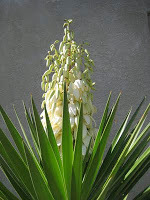 My life since then has been rocky, on-the-edge and unconventional. It's been scary, disrupted and a distant remove from what most people still cling to as "security." It's also been creative, exhilarating, passion-filled, vibrant, exciting, adventurous and enriching. It has pushed me beyond the boundaries of what I believe and what I believe I want, and it has propelled me beyond the frontiers of the conventionally possible. In every moment, it steers me on a course I could never consciously chart for myself. And in every breath, it reminds me that the story knows best -- the story I'm living as much as the story I'm writing.
My life since then has been rocky, on-the-edge and unconventional. It's been scary, disrupted and a distant remove from what most people still cling to as "security." It's also been creative, exhilarating, passion-filled, vibrant, exciting, adventurous and enriching. It has pushed me beyond the boundaries of what I believe and what I believe I want, and it has propelled me beyond the frontiers of the conventionally possible. In every moment, it steers me on a course I could never consciously chart for myself. And in every breath, it reminds me that the story knows best -- the story I'm living as much as the story I'm writing.I wouldn't have it any other way.
"I've never been like other people. Not other fathers, not other businessmen. I have never fit into any social norm. And you know what? I don't want to."
~ Frank Lloyd Wright, in Loving Frank
• Photos by Mark David Gerson
Published on May 22, 2011 00:11
May 6, 2011
Infinite Creation, Infinite Mind

"If you do the land's bidding, you can build a house that's organic to it."
~ Frank Lloyd Wright, in Nancy Horan's fictional biography, Loving Frank
Although Wright speaks here about architecture, what he says applies to all manner of creation. If you do a story's bidding, you can build a novel, screenplay, short story or nonfiction book that's organic to it. And if you do a soul's bidding, you can build a life that's organic to it, too. For isn't life the ultimate creative act?
Too often, we allow the limitations of what we think we know to constrict what's possible, what's natural, what's organic. But the possible, natural and organic have nothing at all to do with what the human mind perceives. They have everything to do with what the infinite mind perceives.
You don't have to believe in God to believe in "infinite mind." For all that the concept of infinite mind suggests is that there is a wisdom that transcends our conscious thoughts, desires and creations. How often has a notion popped into your head that seems to make no conventional sense? And how often have you followed it through only to discover, perhaps in distant retrospect, that it made more sense than anything else you could have ever possibly tried to figure out?
 That's God or infinite mind or the muse or, as Wright might put it, nature at work.
That's God or infinite mind or the muse or, as Wright might put it, nature at work. My whole life, it seems, has been predicated on that notion -- that there's a force at work that has a much clearer sense of what will serve and satisfy my deepest (often hidden) desires than the childish cravings of a limited mind ever could.
My author friend Adam Bereki describes it as watching the game not from the field or the stands, but from a blimp floating high above the stadium. It's not a blimp that's separate from us, any more than God, muse, infinite mind or nature are. These are all aspects of all of us, all pieces we carry within us. What we don't all do is acknowledge, access and experience it. What we don't all do is let it, with its broader, deeper perspective and infinite wisdom, be in charge.
Writers often balk when I suggest that their stories are smarter, wiser, cannier and craftier than they could ever hope to be. Writers, like all human beings, would prefer to believe that they can be in control and still create from a place of infinite possibility.
 Not even the God of Genesis is that arrogant. God doesn't "make" creation happen. God allows creation to occur. "Let there be light," He says. And light appears. Not because God forces His will on it. But because he allows light its natural form, shape and substance. And when each day's creation is done? He doesn't sit in judgment over it, calling it worthy or unworthy. He recognizes that all creation has innate merit and declares it to be "good."
Not even the God of Genesis is that arrogant. God doesn't "make" creation happen. God allows creation to occur. "Let there be light," He says. And light appears. Not because God forces His will on it. But because he allows light its natural form, shape and substance. And when each day's creation is done? He doesn't sit in judgment over it, calling it worthy or unworthy. He recognizes that all creation has innate merit and declares it to be "good.""...a genius is merely the man who sees nature, and has the boldness to follow it."I spent more than half the years I've lived so far with my eyes closed and ears blocked to infinite mind, my infinite mind. Although we're all born with a direct link to that source of wisdom and, as young children, act from it, we're often shut down to it by a so-called "grown-up world" that is in fearful denial of anything that can't be accessed by the five physical senses. I don't know why or when I was shut down, or by whom. But, clearly, I was. And it wasn't until a creative and spiritual awakening began to move through me in my early to mid-30s that I began to to tune in to the infinite possibilities of the invisible.
~ Frank Lloyd Wright, in Loving Frank, by Nancy Horan
 My life since then has been rocky, on-the-edge and unconventional. It's been scary, disrupted and a distant remove from what most people still cling to as "security." It's also been creative, exhilarating, passion-filled, vibrant, exciting, adventurous and enriching. It has pushed me beyond the boundaries of what I believe and what I believe I want, and it has propelled me beyond the frontiers of the conventionally possible. In every moment, it steers me on a course I could never consciously chart for myself. And in every breath, it reminds me that the story knows best -- the story I'm living as much as the story I'm writing.
My life since then has been rocky, on-the-edge and unconventional. It's been scary, disrupted and a distant remove from what most people still cling to as "security." It's also been creative, exhilarating, passion-filled, vibrant, exciting, adventurous and enriching. It has pushed me beyond the boundaries of what I believe and what I believe I want, and it has propelled me beyond the frontiers of the conventionally possible. In every moment, it steers me on a course I could never consciously chart for myself. And in every breath, it reminds me that the story knows best -- the story I'm living as much as the story I'm writing.I wouldn't have it any other way.
"I've never been like other people. Not other fathers, not other businessmen. I have never fit into any social norm. And you know what? I don't want to."
~ Frank Lloyd Wright, in Loving Frank
• Photos by Mark David Gerson
Published on May 06, 2011 08:11
May 4, 2011
Only in the Movies...
 1. It is always possible to park directly outside any building you are visiting.
1. It is always possible to park directly outside any building you are visiting.2. A detective can only solve a case once he has been suspended from duty.
3. If you decide to start dancing in the street, everyone you bump into will know all the steps.
4. Most laptop computers are powerful enough to override the communication systems of any invading alien civilization.
5. It does not matter if you are heavily outnumbered in a fight involving martial arts; your enemies will wait patiently to attack you one by one by dancing around in a threatening manner until you have knocked out their predecessors.
6. When a person is knocked unconscious by a blow to the head, she or he will never suffer a concussion or brain damage.
7. No one involved in a car chase, hijacking, explosion, volcanic eruption or alien invasion will ever go into shock.
8. Police departments give their officers personality tests to make sure they are deliberately assigned a partner who is their total opposite.
9. When they are alone, all foreigners prefer to speak English to each other.
10. You can always find a chainsaw when you need one.
 11. Any lock can be picked by a credit card or a paper clip in seconds, unless it's the door to a burning building with a child trapped inside.
11. Any lock can be picked by a credit card or a paper clip in seconds, unless it's the door to a burning building with a child trapped inside.12. An electric fence, powerful enough to kill a dinosaur will cause no lasting damage to an eight-year-old child.
13. Television news bulletins usually contain a story that affects you personally at that precise moment you turn the television on.
~ Author unkown
Published on May 04, 2011 16:44
April 30, 2011
Mark David's "Rules" for Writing
 These so-called rules, adapted from the ones I crafted for my book on writing/creativity, The Voice of the Muse: Answering the Call to Write, are intentionally similar to my other set of "rules," for living.
These so-called rules, adapted from the ones I crafted for my book on writing/creativity, The Voice of the Muse: Answering the Call to Write, are intentionally similar to my other set of "rules," for living. They're similar because I believe that the same precepts that can guide us to more creative, imaginative, expressive, passion-filled and spontaneous writing and artistry apply equally to living a more creative, imaginative, expressive, passion-filled and spontaneous life.
Rule #1
There are no rules: How can there be when creativity is all about breaking new ground and breaking old rules?
Rule #2
Be in the moment: Focus only on the word you're writing. The next one will come if you don't worry about it.
Rule #3
Trust the voice of your Muse without judgment or censorship. It's smarter than you are and knows the story better than you ever will.
 Rule #4
Rule #4Go for the jugular: Write from a place of powerful emotion, especially the one you'd rather not write about.
Rule #5
Love yourself and your words...every draft.
Rule #6
Don't force your words into the straitjacket of your preconceptions and expectations. Free them to take on the form that is theirs.
Rule #7
If you're feeling stuck, keep your pen moving. Write anything!
Rule #8
Always go with first thoughts. Second-thoughts are self-censoring thoughts.
 Rule #9
Rule #9 You're not in charge, so get out of the way and let your story have its way with you.
Rule #10
Write: Commit to yourself as the writer you are.
Rule #11
Set easy goals and meet them. Set yourself up for success not for failure.
Rule #12
Empower yourself: This is your creative journey. Don't let anyone else take charge of it.
Rule #13
There are no rules. None. Never.
Click here to read my "rules" for living. You'll find a more detailed version of the writing rules in The Voice of the Muse: Answering the Call to Write and on The Voice of the Muse Companion: Guided Meditations for Writers.
• Artwork -- #1 Mark David's hand, standing in for that of Old Toshar in the The MoonQuest; #2 The Elderbard's scroll in The MoonQuest book, designed by Angela Farley; #3 The Muse in The Voice of the Muse: Answering the Call to Write, designed by Richard Crookes.
Published on April 30, 2011 15:44
April 27, 2011
Mark David's "Rules" for Living
 These so-called rules have been on the home page of my website for a few years now, inspired by the "rules" for writing I first crafted for my book on writing/creativity, The Voice of the Muse: Answering the Call to Write. I'll post the writing rules another day. But for now, I offer these on a day when, it seems, a lot of us (including me!) need reminding what it takes to live a creative, passion-fllled life.
These so-called rules have been on the home page of my website for a few years now, inspired by the "rules" for writing I first crafted for my book on writing/creativity, The Voice of the Muse: Answering the Call to Write. I'll post the writing rules another day. But for now, I offer these on a day when, it seems, a lot of us (including me!) need reminding what it takes to live a creative, passion-fllled life.Rule #1
There are no rules: There is no right way. There is no wrong way. There is only your way.
Rule #2
What works today may not work tomorrow, so you might as well live in the present moment.
Rule #3
Listen to your heart and trust it; it speaks with the voice of God (or whatever you call that divine intelligence we all carry).
Rule #4
Be vulnerable: Share your pain and your passion. That's what makes you human.
 Rule #5
Rule #5 Treat yourself as you would your child or best friend: with love, compassion and respect.
Rule #6
It's not what you do, it's how you live (and love).
Rule #7
It's not how often you meditate, it's whether you live your life as a meditation.
Rule #8
It's not what you shed, it's what you embrace.
Rule #9
It's not how hard you push, it's how fully you surrender.
Rule #10
Find your passion and embrace it. Passionately.
 Rule #11
Rule #11 It's not about being perfect, it's about being human.
Rule #12
Empower yourself: This is your life. Don't let anyone else tell you how to live it (or not live it).
Rule #13
There are no rules. None. Never.
To read my "rules" for writing (remarkably similar to these "rules" for living), check back here in a few days. If you can't wait, you'll find them on my website. You'll find a more detailed version in The Voice of the Muse: Answering the Call to Write.
• Photos by Mark David Gerson (c) 2011, 2012 -- #1 Supermarket flower, Albuquerque, NM; #2 Butterfly, University of New Mexico; #3 Oceanside Pier, Oceanside, CA. For reprint/sale info, contact Mark David.
Published on April 27, 2011 10:11
April 24, 2011
Cut the Damn Fat!
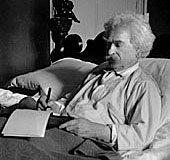 "Substitute 'damn' every time you're inclined to write 'very'; your editor will delete it and the writing will be just as it should be."
"Substitute 'damn' every time you're inclined to write 'very'; your editor will delete it and the writing will be just as it should be."
~ Mark Twain
Have you used two or three words -- or sentences -- where one would do?
Keep your work lean and trim. Say more with less.
Look for words like "very," "actually," "really" and "quite."
More often than not, actually, they are really quite unnecessary.
Can you put the previous sentence on a diet and trim it from 10 words to four?
Adapted from Rule #9 in "Eighteen Rules for Revising Your Work," from The Voice of the Muse: Answering the Call to Write (LightLines Media, 2008)
Photo: Mark Twain -- damning his very's?
Published on April 24, 2011 14:44
April 14, 2011
It's Getting To Be a (Writing) Habit With Me...
 Everyone approaches the writing process differently. Everyone has a different way in to the blank page. Truly, there is no right or wrong way. Here's a peek into my writing life...as it is right now...
Everyone approaches the writing process differently. Everyone has a different way in to the blank page. Truly, there is no right or wrong way. Here's a peek into my writing life...as it is right now...1) Do you write on the computer or longhand?
All of the above. But no quill, despite the graphic illustrating this post!
I wrote The MoonQuest entirely in longhand, though each evening I input up that morning's output so as not to be faced with having to type up the whole thing when I was done. I write about that experience and why it was so important for me in The Voice of the Muse: Answering the Call to Write, which itself was written partly in longhand and partly on the computer.
These days, I do most of my writing directly on the computer...unless I'm stuck, in which case pen and pad are great unstickers.
2) Is coffee or tea part of your writing routine?
I used to favor tea. Now that I have access to an excellent espresso machine , I like to write with a half-caf café americano (milk, not cream!) by my side. When I work in a café, a soy latte (also half-caf) is my drink of choice (see #7).
3) Do you write best during the day or at night?
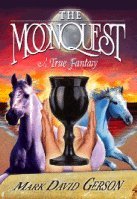 I wrote the first 100 manuscript pages of The MoonQuest in bed in the morning, before getting up. It was the only way I could guarantee that I would get to the writing. Most of the rest of the book was also written in the morning, before the day's distractions set in. (See I Can't Write Until I...)
I wrote the first 100 manuscript pages of The MoonQuest in bed in the morning, before getting up. It was the only way I could guarantee that I would get to the writing. Most of the rest of the book was also written in the morning, before the day's distractions set in. (See I Can't Write Until I...) Parts of The Voice of the Muse were written in the car on my way to work (mornings). My MoonQuest and StarQuest screenplays were written at all hours.
Although I still prefer to write in the morning, which is when I'm doing most of my writing on The SunQuest screenplay, I do some of my best writing late in the afternoon, which is when I wrote this piece.
4) What's your favorite genre to write in?
It seems that I don't really choose my genres. They choose me...and I surrender. For example, I never expected to be writing fantasy...until The MoonQuest started spilling out of me. Even The Voice of the Muse wasn't a book I planned to write. It just sort of happened to me. And I certainly never expected to be writing screenplays, which is my current focus. Who knows what will come next!
4a) Favorite genre to read?
I spent many years devouring contemporary and older classics -- American, Canadian and European -- and have plowed through a lot of young adult fantasy, as well as books about spirituality, creativity, metaphysics and personal growth over the years. For a while, in recent years, I was taking a break from all that, reading mostly mysteries and thrillers. These days, my tastes seem to be broadening again...though they're still largely focused on fiction.
5) Do you use a pencil, pen or computer to revise/edit?
I almost never used to revise/edit onscreen, unless it was a short newsletter or a blog piece. These days, I still prefer to revise fiction in hard copy, with pen or pencil. But I nearly always edit screenplays on the screen.

6) Do you have any unusual writing quirks, traits or routines?
Earlier in my writing life, I would set up a little altar -- consisting of favorite crystals, art and other (legal) mood-altering devices. I even carried a portable version of my altar with me in the car if I thought I would be writing there. It's been a long time since I've needed that sort of help getting into a meditative space for writing. Generally, I just jump in.
7) Do you prefer writing from home or writing in a cozy cafe?
I have favorite cafés I've worked from over the years. These days, I'm doing more writing at home. But if you follow me on Facebook, you know I have a weakness for hanging out in Starbucks!
8) Do you prefer music or silence while your write?
Both. Depends on my mood. When it comes to music, I prefer something meditative if I'm writing fiction. I'm a bit more flexible with other kinds of writing.
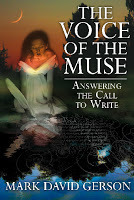 9) What's your favorite motivational writing quote?
9) What's your favorite motivational writing quote?Mine, from The Voice of the Muse: "The story knows best." It's proven itself to be true more times than I can count -- in my writing and in my life. So has this one, which also appears in The Voice of the Muse: "Rule #1: There are no rules. There is no right way. There is no wrong way. There is only your way." Another quote, this one from The MoonQuest, also covers my writing philosophy: "You either trust or you do not. There's no halfway in between."
10) Do you have a favorite bookmark?
Any scrap of paper...when I can't lay my hands on the one my daughter made for me a few years ago.
11) What's your favorite fictional character of all time?
I hate "favorites" questions! I'd have to say that my favorite fictional character is the one who is engaging me in a given moment.
12) Who's your most admired living writer today?
See #11.
• What are your writing habits? How have they changed over the years? Please share them here.
• Both The Voice of the Muse: Answering the Call to Write and The MoonQuest: A True Fantasy, are available on my website and Amazon
 , as is The Voice of the Muse Companion: Guided Mediations for Writers. The MoonQuest is now on its way to feature-film production.
, as is The Voice of the Muse Companion: Guided Mediations for Writers. The MoonQuest is now on its way to feature-film production.• Please "like" The MoonQuest book and movie on Facebook!
Photo by Mark David Gerson: Pencil Bluff, Arkansas

Published on April 14, 2011 20:11
April 7, 2011
Please "Like" The MoonQuest on Facebook!
 It's only taken me three-plus years, but I've finally created a Facebook fan page for The MoonQuest. I would love it if you'd "like" it...and encourage your friends to do likewise. I'd appreciate the support -- for both the book and the feature-film-in-progress!
It's only taken me three-plus years, but I've finally created a Facebook fan page for The MoonQuest. I would love it if you'd "like" it...and encourage your friends to do likewise. I'd appreciate the support -- for both the book and the feature-film-in-progress!• Here's the link to The MoonQuest fan page on Facebook
Also, if you've read The MoonQuest -- or The Voice of the Muse: Answering the Call to Write -- and you email me a photo of you reading it, I'll post the photo in my Facebook Readers' Gallery, along with a caption promoting your book, business, event, blog, website or other success. When I've collected enough, I'll repost the photos on my blog. (Here's the most recent Reader Pic Post.)
Need my email address? Contact me via my website or Facebook.
Thanks!!
Published on April 07, 2011 18:39
April 1, 2011
Just Start...and Trust Your Inner Vision
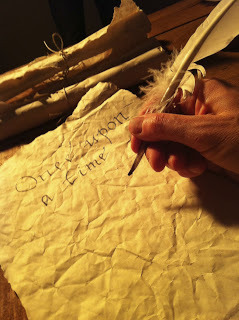 Old Toshar: How do I start? This story has so many beginnings and no clear ending.
Old Toshar: How do I start? This story has so many beginnings and no clear ending. Na'an: Where all stories begin... Once upon a time.
~ The MoonQuest
Just start, and trust your inner vision.
Just start, and know that the words that long to pour from your heart will find their way onto the page — thought by thought, word by word, breath by breath.
For the words are there. The story is there. It exists already — in another dimension, a parallel reality. It exists with a life and an imperative of its own.
Just start, and know the words will flow. Know they will flow without having to know what they are or where they will carry you when you free your story to unfold onto the page.
See the words appear as magically as the lemon-juice ink we used as children to create invisible writing. Hold your page to the light — the light of your heart and the light of your truth — and let your words take shape.
Watch the letters form on the page. See them combine into words, the words join into sentences, the sentences unite into paragraphs and the paragraphs flow from page to page to page until the story is done, until the work is complete and you, who started with nothing but a blank page and faith in the power of your inner vision, are amazed and awestruck by the power of your pen.

• You'll find additional tips and inspiration on my website, where you can read my "Rules for Writing," sign up for my mailing list and read/hear free excerpts from The Voice of the Muse: Answering the Call to Write, from which this piece was adapted.
• Please "like" The MoonQuest's new fan page on Facebook!
Published on April 01, 2011 12:11

